|
October 13, 2021 - No. 94
Ontario Government to Allow Compensation Board to
Distribute "Surplus" to Employers
All Out to Oppose Attacks on
Injured Workers!
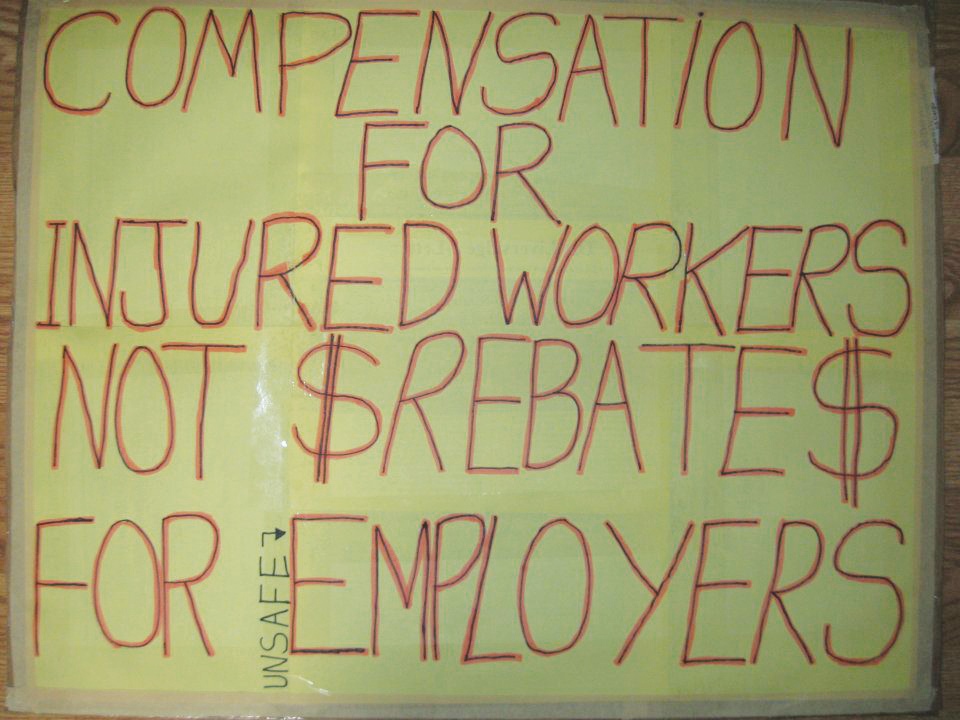 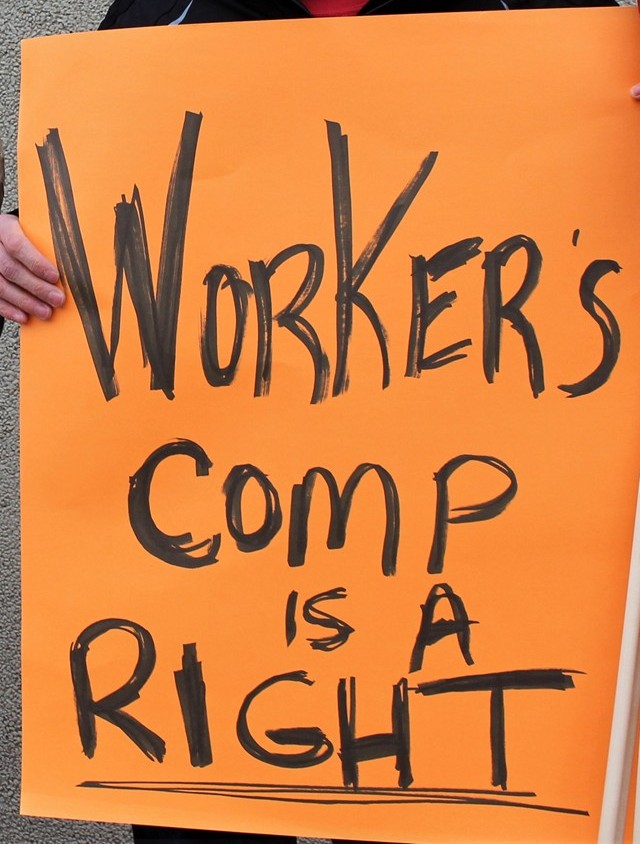
• We All Need to Work Together Against These Drastic Changes Affecting Workers and Workers' Benefits Across Canada.
- Interview, Steve Mantis
Ontario Government to Allow Compensation Board to Distribute
"Surplus" to Employers
On October 6, Ontario's Minister of Labour, Training and Skills
Development, Monte McNaughton, said that he would be tabling
legislation before the end of October that will enable the Workplace
Safety and Insurance Board (WSIB) to distribute "surplus"
funds to employers. This will be done either by sending them money
directly or by reducing their premium rates.
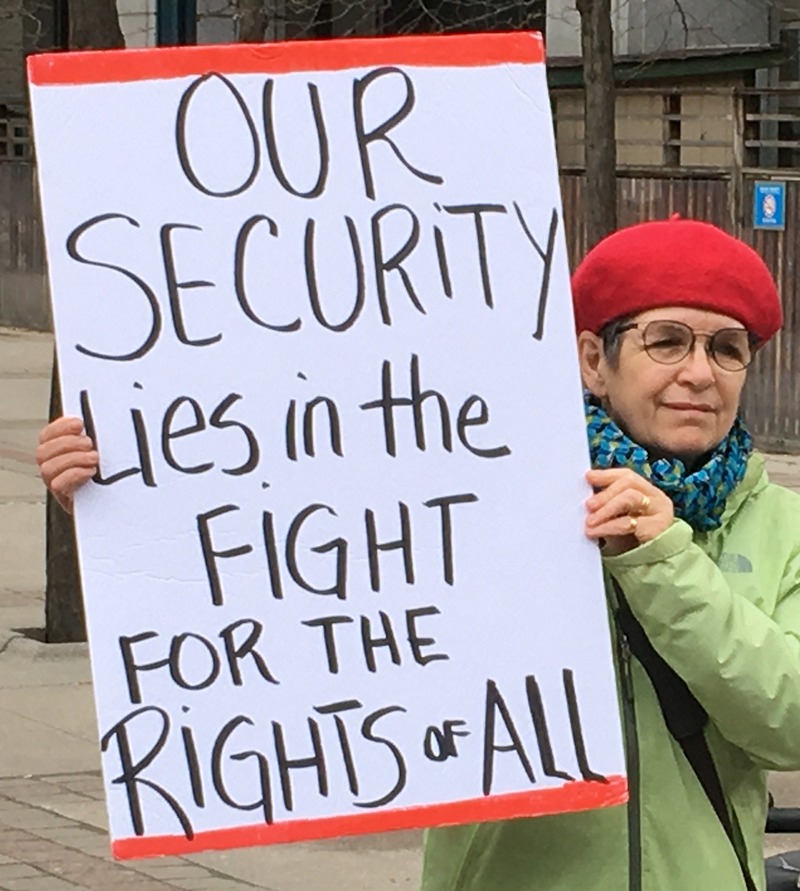 This
announcement follows a fraudulent backroom consultation that was held
by the WSIB in the summer with private interests. No information on the
consultation or invitation to take part was provided to injured
workers' organizations. It is only because of their sustained work for
justice and against the suppression of their voices that they
learnt about the consultation and insisted on presenting briefs. They
also held virtual meetings to inform people of the government's plan
and to denounce any mention of a "surplus" without reversing the
decades of cuts to compensation for injured workers by successive
governments. This
announcement follows a fraudulent backroom consultation that was held
by the WSIB in the summer with private interests. No information on the
consultation or invitation to take part was provided to injured
workers' organizations. It is only because of their sustained work for
justice and against the suppression of their voices that they
learnt about the consultation and insisted on presenting briefs. They
also held virtual meetings to inform people of the government's plan
and to denounce any mention of a "surplus" without reversing the
decades of cuts to compensation for injured workers by successive
governments.
As is the case with the Employment Insurance regime, this so-called
surplus was created under the hoax of providing sustainability to the
compensation system. Actually it was achieved through drastic cuts to
benefits to injured workers, pushing them into extreme poverty, while reducting rates for employers. The result of the
distribution of the "surplus" funds to employers through legislation is
going to be exactly the same.
Injured workers have made it clear that their demands must be met by
WSIB and that justice for injured workers must be the aim of the
compensation system. They firmly oppose the use of the system as one
more scheme to pay the rich at the expense of the workers and people,
in this case some of the most vulnerable.
All Out in Defence of the Dignity and Rights of Injured Workers!

- Interview, Steve Mantis -

Steve Mantis is Chair of the Research Action
Committee of the Ontario Network of Injured Workers Groups(ONIWG).
Workers' Forum: What are your views on the Ford
government's recent announcement about upcoming legislation to allow
the WSIB (Workplace Safety and Insurance Board) to distribute what it
calls "surplus funds" to employers?
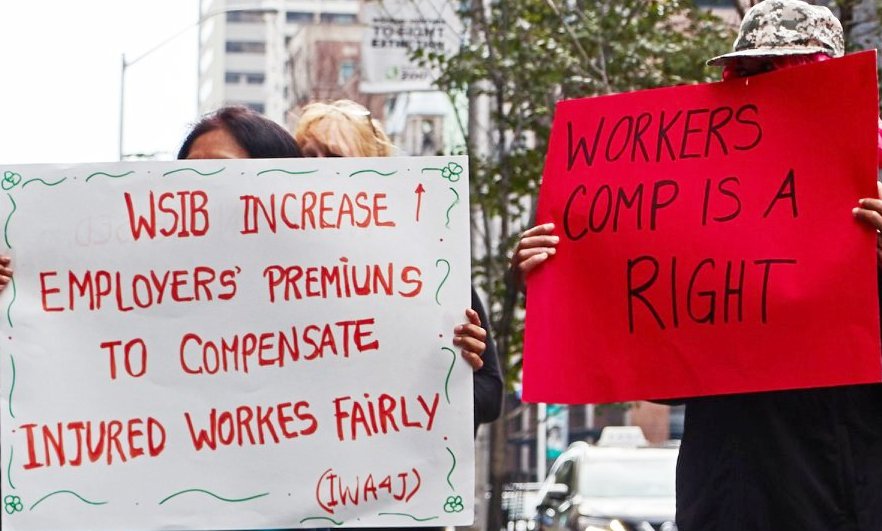 Steve Mantis:
The Ontario government is denying workers medical care and financial
benefits and is sending their financial savings back to big
corporations. It is the exact opposite of what our public system was
designed to do. It was designed to help workers when they became
injured or were made ill on the job. The system
now is being designed to be a revenue generator for corporations. Steve Mantis:
The Ontario government is denying workers medical care and financial
benefits and is sending their financial savings back to big
corporations. It is the exact opposite of what our public system was
designed to do. It was designed to help workers when they became
injured or were made ill on the job. The system
now is being designed to be a revenue generator for corporations.
We need to understand that it is an attack on all of us. Some
workers may think that they are okay if they are not injured but this
is just one of many attacks that workers are experiencing around not
only their health and safety, but their income, their employment
benefits, their ability to make an honest living in a safe environment.
At the same time, we are in the middle of a pandemic and the Ontario
government refuses to recognize in a meaningful way that transmission
happens at work. To prevent that, we need to give workers legislated
sick days so that they can protect themselves and others when they are
at risk. But the government is saying No!, that corporations
cannot afford that. So, once again, workers who are at high risk and are
often in precarious situations, along with their families and
communities, are left to face the most dire health consequences because
of the pandemic.
 And
this is happening across the board. Recently, we had Karen Messing join
our regular injured workers session in Thunder Bay. She is a retired
professor from UQAM (Université du Québec à
Montréal). She is one of the best researchers on health and
safety, a biologist and ergonomist, and has done a lot of work with
Quebec unions and women's groups. Her focus is on women's health and
safety at work. She gave us an update on the law that just passed in
Quebec around occupational health and safety, which goes so far as to
attack joint health and safety committees, which is just crazy. Workers’ Forum was the only publication where we could go to get some English language information on this legislation. And
this is happening across the board. Recently, we had Karen Messing join
our regular injured workers session in Thunder Bay. She is a retired
professor from UQAM (Université du Québec à
Montréal). She is one of the best researchers on health and
safety, a biologist and ergonomist, and has done a lot of work with
Quebec unions and women's groups. Her focus is on women's health and
safety at work. She gave us an update on the law that just passed in
Quebec around occupational health and safety, which goes so far as to
attack joint health and safety committees, which is just crazy. Workers’ Forum was the only publication where we could go to get some English language information on this legislation.
In British Columbia, the Ombudsperson has just put out a report
about how the policies of the compensation board in that province are
putting workers at risk, particularly of re-injury and poverty, which
we see happening all the time.
There's not a lot of research. But what we have seen in different
jurisdictions around the world, from Australia to British Columbia,
Ontario, Washington State, is that somewhere between 35 and 40 per cent
of workers who have had a serious injury and are forced back to work,
get hurt again at work and become further disabled. The Ombudsperson's
report in British Columbia puts it clearly: the doctor says that this
worker cannot go back to work, that it is unsafe, yet the compensation
board says "Well, we think this worker can go back to work, doing light
duty," and they are cut off benefits. So the worker has to consider
either to go back or to lose his or her apartment or home and become
homeless. So they go back to work and that is where that high injury
rate happens. Then after it has happened, you can be embroiled, as in
the case that the Ombudsperson in British Columbia studies, for five
years, if you can stand it, in an appeal system to be able to get a
fair decision at the end.
Going back to Ontario, the compensation board has saved $2 billion a
year. They have reduced the amount of money in their total expenses by
50 per cent. They spend $2 billion less now than they spent 10 years
ago. This has been progressive, it has taken them since 2010 to slowly make more and more cuts. They went through a whole
process to identify where they were spending the most money and then
they put policies in place "to stop the bleeding" as they would say.
For example, different groups were targeted, such as women,
francophones, immigrants, who they said were getting benefits too
frequently. They had strategies to reduce the benefits these people
were
receiving.
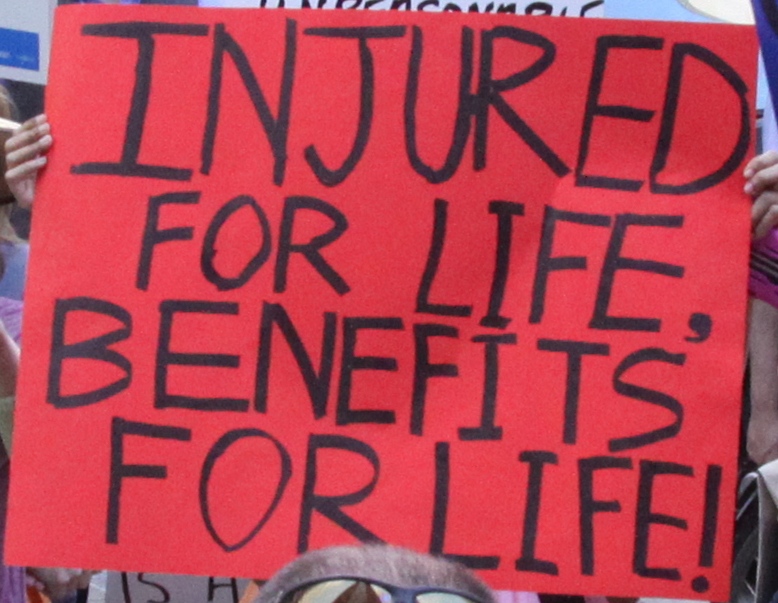 They
have really targeted workers with serious injuries as the biggest
expense of this system, because they are on benefits longer. The impact
of their injury goes on for a long time, even a lifetime. They
have really targeted workers with serious injuries as the biggest
expense of this system, because they are on benefits longer. The impact
of their injury goes on for a long time, even a lifetime.
In Ontario, there are about 20,000 new workers who suffer a lifetime
injury every year. Around 350,000 people put in a claim every year.
Research shows that large numbers of people never file a claim,
especially precarious workers who have no job security, who just live
on the edge and do not have a good employment situation. They are
afraid that if they make a claim, their job could be at risk.
So every year, they have had a surplus. They used to spend around
$4.3 or $4.5 billion a year. Now they are spending half of that. They
have surplus revenues coming in, and that becomes their reserve fund.
And now their reserve fund is about $40 billion. And from their
calculation, with their own internal auditor and actuary, they
determined
that they have about $33 billion in future liabilities. This means that
for people like me and all the other injured workers who are on the
longer-term benefits, if they had to pay us all out today, it would
cost $33 billion. They have about $7 billion more than they need.
They play with those numbers, which change a lot because a lot of
that money is in stock markets. So when stocks go up and down, the
amount they have in reserve goes up and down. This is what caused the
crisis in Ontario that happened 10 years ago when the government said:
"You have to make sure you have all the money in the bank and you don't
right now." That was right after the stock market crash in 2008-2009.
The money has all come back since the stocks were down almost 50 per
cent after the big economic collapse. The money came back but the
assessment that was done in 2010 was that the financial situation was
very bad, that this was a crisis. Anyone who knows how the stock market
works knows that the money is going to come back. Part of the surplus
they have, that $7 billion, is because the stock market is doing well.
That creates revenue as well.
 WF:
What are the main demands that ONIWG is putting forward with regard to
the plan to distribute the “surplus” to employers? WF:
What are the main demands that ONIWG is putting forward with regard to
the plan to distribute the “surplus” to employers?
SM: ONIWG has submitted a brief, and so did a number
of local activists and organizations including the Ontario Federation
of Labour and a IWC Community Legal Clinic. A lot of submissions went to
the government, which held a short consultation.
What we said is that we have to look after injured workers before we
start sending any money to corporations and employers. Our demand is
that they have to fulfill their obligations to the workers the system
was set up to provide for.
We went back to our three main demands which is where you see them using these bogus policies to reduce benefits.
Number one is to listen to the treating doctor rather than ignoring
and over-ruling them and putting workers at risk. The treating
physician should be listened to.
The second is to stop declaring people employed when they are
not. Part of that is declaring injured workers employable and
then stopping benefits. They go hand in hand. We often refer to that in
Ontario as 'deeming.'
The third is to stop using
pre-existing conditions as a way of cutting people off benefits. That
happens quite often. Once the worker has reached a kind of plateau,
where they have recovered as much as can be expected, if there is any
residual disability it is claimed that it's because something else
happened, not related to the work injury.
WF: What would you like to say in conclusion?
SM: We all need to work together to oppose these
drastic changes that are happening to workers and to workers' benefits
across Canada. 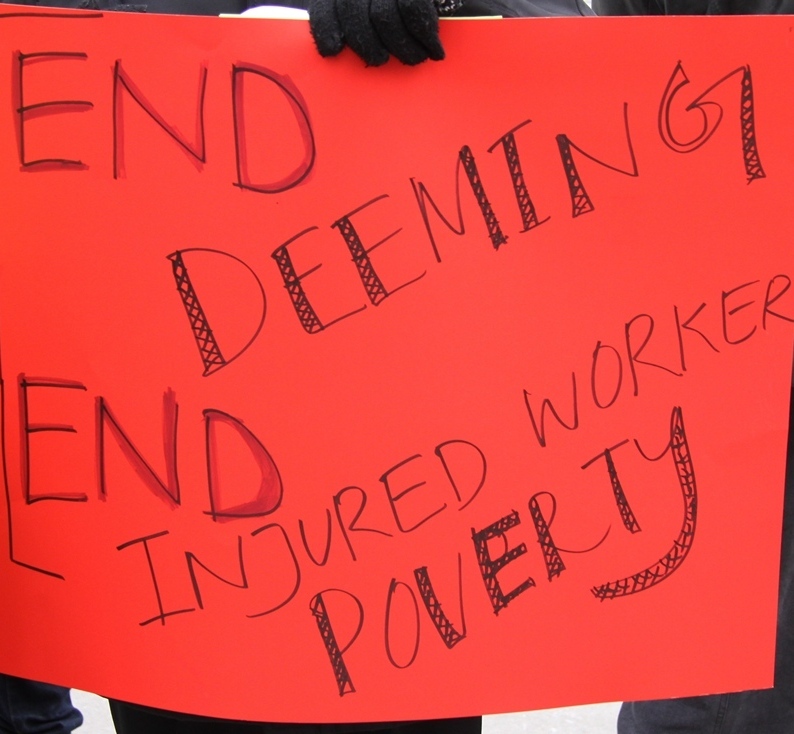  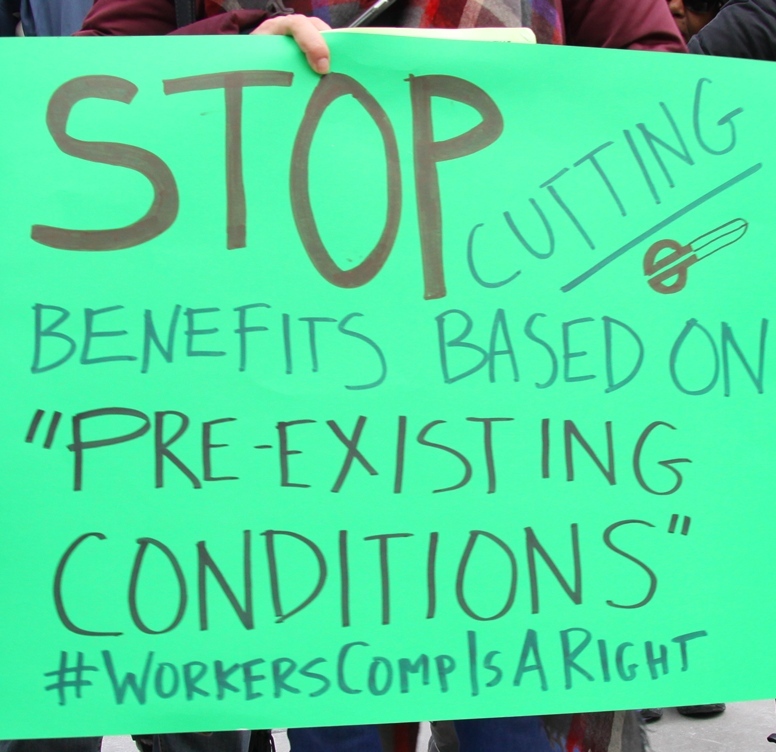

(To access articles individually click on the black headline.)
PDF
PREVIOUS
ISSUES | HOME
Website: www.cpcml.ca
Email: office@cpcml.ca
|

